Share
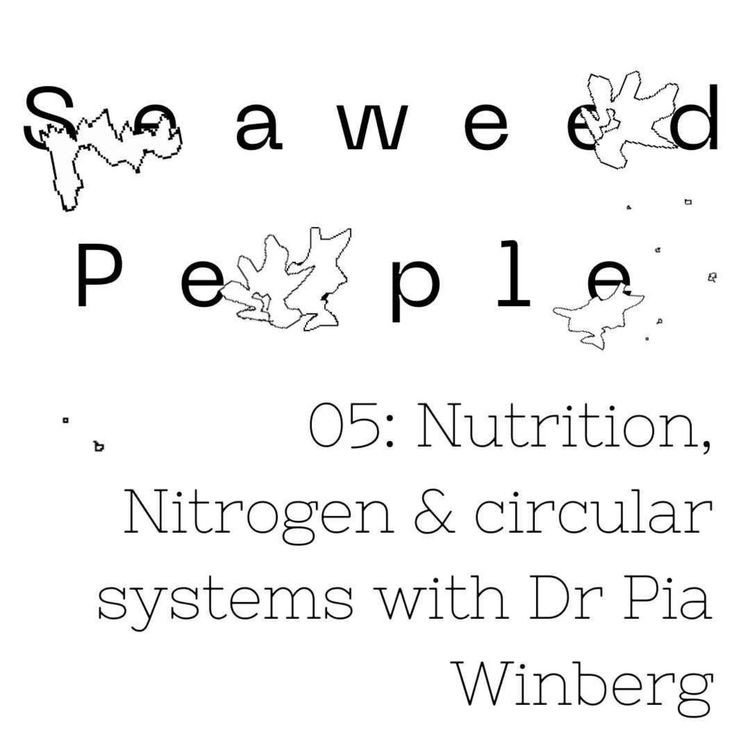
Seaweed People
Nutrition, Nitrogen & circular systems with Dr Pia Winberg
This episode’s for you if you’re into eating seaweed, sustainable food systems, Nitrogen cycles, how seaweed can heal burns, or if you’ve ever daydreamed about being a humble seaweed farmer 🧑🌾🍝
Dr Pia Winberg is a marine ecologist who’s spent the past 25 years working in and researching sustainable marine development. In her words, she’s now in “the business of growing seaweed in a circular economy” and her main focus is developing systems to sustainably cultivate seaweeds in Australia. She runs two companies, Phycohealth and Venus Shell Systems, she has seaweed products on the shelves of supermarkets and she’s currently testing the wound-healing properties of seaweed cells.
You can find Pia at Phycohealth or Venus Shell Systems and on social media @phycohealth. You can find and contact me @seaweed.people.
Links to research, projects and stories touched on in this ep:
People in Europe ate seaweed for thousands of years
Your Evidence Based Guide to Seaweed a Superfood for the Gut
Iodine levels in seaweed and seaweed products in Australia
The Australian prawn farm raising the bar for sustainable aquaculture (not Sri Lanka, but same vibe)
What Is the Nitrogen Cycle and Why Is It Key to Life?
More on how Pia’s seaweed factory works
Pia’s personal story of seaweed & wound healing
Seaweed and skin - skincare and wound healin
Harvesting seaweed to make skin from the sea
This episode was recorded and made on Gadigal/Wangal land. I acknowledge and pay respects to First Nations people and their elders past and present as the ongoing custodians of Sea, Land and Sky Country.
More episodes
View all episodes
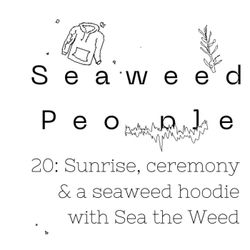
20. Sunrise, ceremony & a seaweed hoodie with Sea the Weed
38:54||Season 1, Ep. 20This one’s for early risers and big dreamers, those of you into kelp restoration fans, clothes made of seaweed, imagination, snorkelling and a fire by the beach, if you’re interested in how Indigenous Knowledges and ceremony can connect coastal communities, or how corporates can invest in the ocean 🌅🧶Sea the Weed is a collaboration of organisations reforesting 70 hectares of once destroyed Phyllospora Comosa ('Crayweed') along Sydney’s coastline. Throughout 2025, friends Arthur Little and Brenden Newton from AIME have been running a monthly program of sunrise, ceremony and seaweed, drawing human attention back to nature and ‘looking sideways’. We recorded this one at Malabar beach, after a beautiful swim with the reforested crayweed. Find dates and more info on the AIME website here. You can find and contact me @seaweed.people. Donate to support the making of this show at buymeacoffee.com/seaweedpeople. Also, listen to my new project, SOIL: Rewilding the Underground made with Freya Mulvey here. Links to other stuff in this ep: AIME - mentoring & the Imagi-Nation hubOperation Crayweed (also listen to episode 2 with Adriana Verges)Abyss Scuba DivingMaking a Hoodie Podcast with Sea the Weed The Grey Space podcast with Brenden NewtownAIME’s Imagine filmThe seaweed hoodie (+ the Regenerators website)PYRATEX innovative textiles Seaweed fabricBecome a shareholder of the ocean (deck)This episode was recorded and produced on Gadigal & Bidjigal Country. I acknowledge and pay respects to First Nations people and their elders past and present as the ongoing custodians of Sea, Land and Sky Country.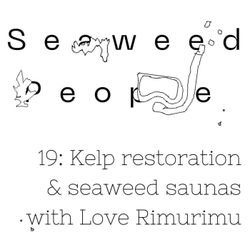
19. Kelp restoration & seaweed saunas with Love Rimurimu (Zoe Studd)
34:34||Season 1, Ep. 19You are going to love this conversation if you dream of spending a week greeting the sun with seaweed songs, having seaweed baths after saunas, if you’re into seaweed tattoos, if you’re a student or a teacher and you wanna go diving, and generally if you’re into the idea of regenerating underwater forests 🤿🛀🏽Along with the team and communities behind Love Rimurimu, Zoe Studd is doing all of these things. Zoe is the Co-Founder and Executive Director of Mountains to Sea Wellington Trust, where she manages both marine and freshwater education programs and citizen science programs, working with schools and communities in Aotearoa New Zealand. We talk about starting kelp restoration projects in schools, regenerating coastlines with science and cultural knowledge, and running a kickass seaweed festival. Follow the Love Rimurimu project here and on their socials. You can find and contact me @seaweed.people. Donate to support the making of this show at buymeacoffee.com/seaweedpeople.Links to other stuff in this ep: Seaweeds of Wellington (video ID)Mountains to Sea WellingtonExperiencing Marine Reserves community programNew Zealand approves first special permit to remove kina barrensProject Baseline WellingtonKelp Forest Alliance website (or listen to Episode 11 with Aaron Eger)Green Gravel GroupLove Rimurimu’s Seaweed Restoration ToolkitSeaweed Fest 2025Hot tubs, seaweed soaks & saunas in IrelandThis episode was recorded and produced on Gadigal Country. I acknowledge and pay respects to First Nations people and their elders past and present as the ongoing custodians of Sea, Land and Sky Country.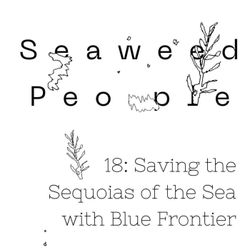
18. Saving the Sequoias of the Sea with Blue Frontier
36:26||Season 1, Ep. 18This episode is for you if you’re wondering what the heck is going on across the sea for our friends in the US, if you’re into citizen science and communities coming together to protect kelp, and if you like a good ocean film 🌊🍿Blue Frontier is a US-based organisation that’s been building solution-oriented citizen engagement for 20 years, to protect oceans, coasts and the human and wild communities that depend on them. We’re joined by Blue Frontier’s David Helvarg and Natasha Benjamin to talk about people-powered conservation, the seaweed rebellion and their new film Sequoias of the Sea, which documents a community of fishermen, tribes and scientists working to restore a kelp habitat devastated by a warming climate.Find out more about Blue Frontier here and follow the film Sequoias of the Sea here. You can find and contact me @seaweed.people. Donate to support the making of this show at buymeacoffee.com/seaweedpeople.Links to research, projects and stories touched on in this ep: Sequoias of the Sea film (US)Blue Frontier - websiteRising Tide - Blue Frontier’s podcastJared Huffman (“Kelp Congressman”)White Rock film by the Great Southern Reef Foundation (Australia)The Australian Urchin Taskforce The Golden Shore: California’s Love Affair with the SeaKelp Forest ChallengeThe Seaweed RebellionThis episode was recorded and produced on Gadigal/Wangal Country. I acknowledge and pay respects to First Nations people and their elders past and present as the ongoing custodians of Sea, Land and Sky Country.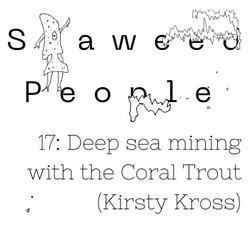
17. Deep sea mining with the Coral Trout (Kirsty Kross)
37:09||Season 1, Ep. 17This one’s for you if you’re an artist, or a scientist or conservationist wanting to communicate in creative ways, and if you love the deep sea, the Great Barrier Reef and Kate Bush 🪸💎Kirsty Kross is an eco-feminist Australian artist currently based in Oslo, Norway, whose work is about finding ways of connecting diverse groups with issues around the climate crisis, often by embodying a vibrant coral trout. We talk about deep sea mining, mesopotamian deities, which countries are two-tit countries and a seaside collaborative opera performance 📣🪼You can find Kirsty at her website or on Instagram @kirstykrosss. You can find and contact me @seaweed.people. Donate to support the making of this show at buymeacoffee.com/seaweedpeople.Deep sea mining links & stories touched on in this ep: Greenpeace AU petition to ban deep sea mining ahead of international ISA meeting in July 2025Pacific Blue petition to ban deep sea mining Blue Peril short film New battleground in critical minerals race is on Australia’s doorstepWhat We Know About Deep-Sea Mining — and What We Don’t Analysis of the implications of deep seabed mining for the global biodiversity framework and the sustainable development agenda (WWF report)Immortal jellyfish! National Treasure at Woollahra Gallery, RedleafThe Cult of Atargatis and Transgender PriestessesJack Halberstam on Queer Failure, Silly Archives and the WildThis episode was recorded and produced on Gadigal/Wangal Country. I acknowledge and pay respects to First Nations people and their elders past and present as the ongoing custodians of Sea, Land and Sky Country.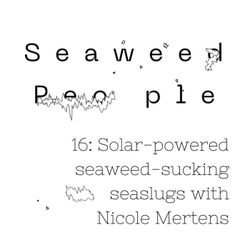
16. Solar-powered seaweed-sucking seaslugs with Nicole Mertens
33:06||Season 1, Ep. 16This one’s for you if you’re into nudibranchs, sea grapes, solar power, butterflies, citizen science and tongues with teeth(!?) 🌱🐛Nicole Mertens is a marine ecologist with a passion for sacoglossans, a science communicator and the Nature Stewards Coordinator with the Victorian National Parks Association. Nicole is passionate about using citizen science as a platform for evidence-based conservation, and helping people connect with their local environment. You can find Nicole and the VNPA team here and on socials @vicnationalparks. You can find and contact me @seaweed.people. Donate to support the making of this show at buymeacoffee.com/seaweedpeople.Links to research, projects and stories touched on in this ep: Seaslug census Facebook group (Australia)iNaturalist - sacoglossans of Victoria (good pics)Nudibranchs - videos + freaky factsShaun the Sheep internet famous nudiKeep your head: the self-decapitating sea slugs that regrow their bodies – hearts and allSolar-powered sea slugs VNPA ReefWatch citizen science programsThis episode was recorded and produced on Gadigal/Wangal and Larrakia Country. I acknowledge and pay respects to First Nations people and their elders past and present as the ongoing custodians of Sea, Land and Sky Country.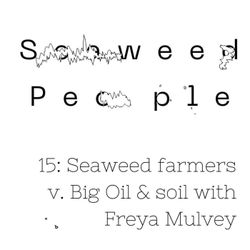
15. Seaweed farmers v. Big Oil & soil with Freya Mulvey
35:07||Season 1, Ep. 15This one’s for you if you’re interested in how a class action case works, if you wanna hear about seaweed farmers taking on big oil companies or if you’re also a soil person 🌱🪱Freya Mulvey is a senior lawyer and environmental enthusiast who is passionate about implementing better soil and landscape regulation into policy and legal frameworks. She is a 2023 Churchill Fellow and a 2017 recipient of the Australian Lawyers Alliance Civil Justice Award for her work on the Montara Oil Spill. She is also a published author of the book Ground Breaking: Soil Security and Climate Change. We're also making a podcast together! You can find Freya on LinkedIn, subscribe to SOIL on Spotify here, find us on socials @soilpodcast or read more at thesoilpodcast.com. Donate to our Pozible campaign by March 16th or via our website afterwards. You can find and contact me @seaweed.people. Links to research, projects and stories touched on in this ep: Indonesian seaweed farmers win class action over one of Australia's largest oil spillsInterview with Greg PhelpsPhil Mulvey, Environmental Earth Sciences InternationalGround Breaking: Soil Security & Climate Change (the book Freya co-authored with Phil Mulvey)SOIL - Pozible campaignSoil on SpotifySeaweed People is completely independent. You can support the making of this show at buymeacoffee.com/seaweedpeople.This episode was recorded and produced on Gadigal/Wangal and Larrakia Country. I acknowledge and pay respects to First Nations people and their elders past and present as the ongoing custodians of Sea, Land and Sky Country.
14. Biochar & the blue economy with Southern Ocean Carbon
38:55||Season 1, Ep. 14This one’s for you if you’re interested in biochar, giant kelp, marine engineering or thinking about seaweed as a solution to a whole lotta problems 🛠️🐟Adam Brancher is a Principle Marine Surveyor and the Founder of Southern Ocean Carbon (now known as Next Wave Seaweed), which aims to mitigate the impacts of climate change through responsible seaweed mariculture and bio-mitigation around aquaculture farms. We touch on a few of the exciting projects his team is working on across the world in this episode, such as growing seaweed for bioplastics, offshore mariculture, IMTA and seaweed for food security. Since this ep was recorded SOC has rebranded to Next Wave Seaweed - you can find them here or on socials @nextwaveseaweed. You can find and contact me @seaweed.people. Donate to support the making of this show at buymeacoffee.com/seaweedpeople.Links to research, projects and stories touched on in this ep: The Problem with Carbon Credits and Offsets ExplainedForensic carbon accounting with Catriona Herd (SP episode)Opportunities and constraints for biochar technology in Australian agriculture: looking beyond carbon sequestration (research)Kelpy (NSW-based seaweed bioplastic)Nopla - bioplasticsBlue Economy CRCHydrodynamic energy attenuation by seaweed aquacultureDeveloping Production Systems for Offshore Kelp MaricultureA new paper on seaweed explores its potential in nourishing low- and middle-income nationsSome info on IMTA (integrated multi-trophic aquaculture)Nutrition, Nitrogen & circular Systems with Pia Winberg (SP episode)This episode was recorded and produced on Gadigal/Wangal and Palawa Pakana lands. I acknowledge and pay respects to First Nations people and their elders past and present as the ongoing custodians of Sea, Land and Sky Country.
13. Reviving Country & communities with the Gamay Rangers
36:53||Season 1, Ep. 13You’ll love this ep, I just know it 🐋🦅 It’s for you if you like baby seahorses and migrating whales, if you live in a coastal city, if you've heard about wildlife coming back into harbours during lockdowns, or if you want to know what a strong collaboration between Indigenous knowledge-holders and western science looks like. Robert Cooley is a Senior Ranger and leader of the Gamay Rangers, an Indigenous ranger team that cares for country on Gamay, or Botany Bay in Sydney, and on conservation land owned by the La Perouse Local Aboriginal Land Council. Since 2019, the Gamay Rangers team have been regenerating coastal habitats, protecting marine mammals, providing food for vulnerable people during Covid lockdowns and connecting local communities to Sea Country in Australia’s biggest city. You can find Robert and the Gamay Ranger team on socials @gamayrangers. You can find and contact me @seaweed.people. Donate to support the making of this show at buymeacoffee.com/seaweedpeople.Links to research, projects and stories touched on in this ep: La Perouse Local Aboriginal Land CouncilOperation Crayweed - restoring Sydney’s underwater forests Operation Posidonia - healing old wounds The Sydney Seahorse Project (SIMS/Gamay Rangers)SIMS Aboriginal Youth Ranger Program Wild Sydney Harbour - citizen science project Country Needs People - what are Indigenous Rangers?Indigenous Rangers (NIAA/gov)This episode was recorded and produced on Gadigal/Wangal and Bidjigal lands. I acknowledge and pay respects to First Nations people and their elders past and present as the ongoing custodians of Sea, Land and Sky Country.
12. Kelp farming & wakame hunting with Southern Seagreens
32:44||Season 1, Ep. 12This one’s for you if you’re into craft beer, you like dreaming up side hustles with your mates, you’re a chef wanting to experiment with kelpy umami or if you’re an aspiring seaweed farmer 👩🏽🍳🍻Cam Hines and Brent “Bert” Cross are two of the three founders of Southern Seagreens. From backgrounds in craft beer and naval diving, they joined forces with Rob (the third, a scientist) to learn how to farm native kelp at their sea farm down in Flinders, Victoria. They also hunt wakame, one of the world’s most invasive (yet delicious) species, and turning it all into tasty treats. You can find Cam & Bert via the Southern Greens website or socials. You can find and contact me @seaweed.people. Donate to support the making of this show at buymeacoffee.com/seaweedpeople.Links to research, projects and stories touched on in this ep: AU government Invasive pests: Wakame control plan Removing wakame (Parks Victoria)Mountain Goat BeerAegir Divers (Bert’s company)GreenWave - global network of regenerative ocean farmersReviving Tassie’s giant kelp with Mick Baron (SP companion episode about Macrocystis)Seaweed babies & kelp farms with Jo Lane (another companion ep about Ecklonia radiata)An Overview of the Alternative Use of Seaweeds to Produce Safe and Sustainable Bio-Packaging (Lomartire et al., 2022 - research)This episode was recorded and produced on Gadigal/Wangal land and Boon Wurrung/Bunurong land. I acknowledge and pay respects to First Nations people and their elders past and present as the ongoing custodians of Sea, Land and Sky Country.